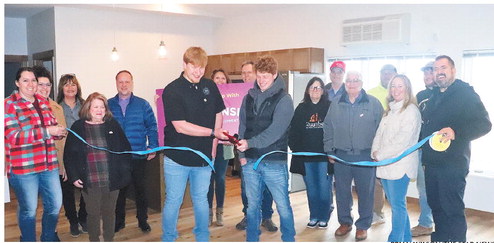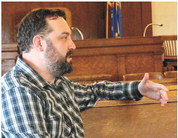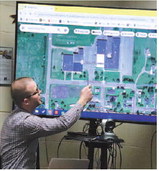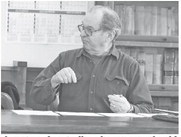All clear


Members of city of Medford Planning Commission made short work of granting a request for a home-based business to be operated on Washington Ave.
At Monday’s meeting, members granted a conditional use permit to Chris and Rebecca Moberg to operate a clinical herbalist business from the couple’s home at 520 Washington Ave.
Clinical herbalists use natural remedies to assist people toward better heath, Chris Moberg noted the Centers For Disease Control cites more than 21,000 plants that have beneficial qualities. “If you learned a new one every day it would take 57 years to learn them all,” said Chris Moberg.
He explained that he will see clients on a one-on-one basis with the client coming to his home and a typical appointment being 60 to 90 minutes. Hours of operation would be between 7 a.m. and 7 p.m.
In making the request for the conditional use permit, the Mobergs noted this would be less interference in the neighborhood than the Holy Rosary school and playground.
According to city planner Bob
See CONDITIONAL USE on page 3 Christensen, while there are things people can do as a matter of right for their property, such as building a home in a residential area, other things that are outside those things need special permission. In the city of Medford this incudes a range of home-based occupations such as running a daycare center because these could have an impact on surrounding residents.
Christensen explained that in these cases, as the Mobergs have done, the property owners can request a conditional use permit which goes to a public hearing with those in the surrounding neighborhood invited to give input.
In the case of running a clinical herbalist business and learning there were no plans for new construction or other things that would disrupt the neighborhood, the response of neighbors attending Monday’s public hearing was positive.
“I think it is awesome you are doing that,” said resident Tim Spinler who lives on Park Ave.
Washington Ave. resident Dawn Rudolph likewise shared her support of granting the conditional use permit noting that she did not see that it would have any real impact on the neighborhood. She noted that with it being one-on-one visits it is not going to be a huge traffic issue.
The city routinely sends out letters to those within 200 feet of the property when conditional use permits are requested with the invitation for people to come to the planning commission meeting or, if they choose, submit comments in writing.
Ed Pinkert, who owns the property directly next to the next to the Mobergs wrote opposing the permit: “I think we have enough traffic on this street with the church, school and playground, and it also seems whenever someone visits next door they never park in front of that address but always park in front of my house. If they would exclusively park in front of 520 S. Washington or on the other side of the street, that would ease some of my concerns.”
In the end, commission members voted unanimously to approve the conditional use permit.
Mobile home rules
In addition to the conditional use permit request, commission members spent time Monday night talking about affordable housing and in particular if the city should look at changing its longstanding restrictions regarding placement of mobile homes.
Under city codes, what are commonly called mobile homes or less accurately “trailer homes” are restricted to being located in designated mobile home parks such as Riverside Terrace and Mink Capital Terrace.
Christensen brought forward the question of if the city should loosen those restrictions to allow these types of homes to be located on lots elsewhere in the city.
The issue is one that becomes quickly complicated due to overlapping terminology used in describing these types of residential units.
See COMMISSION on page 15 In 1976, the federal Housing and Urban Development agency developed codes for the construction of mobile homes. Prior to that time there were no uniform standards in place. Anything built before that time was labeled as a mobile home while after that they were officially designated as “manufactured homes.”
Shared characteristics of these homes is that they are built on a steel chassis and hauled to a location and placed on either a slab or other type of foundation and anchored with strapping with skirting around the base.
While “single wide” units are readily visible, the industry has progressed into double wides, duplexes and even multi-story options which to the casual observer could be indistinguishable to other types of homes.
Christensen explained that this should not be confused with “manufactured dwellings” which include modular homes. In these, the construction follows the uniform dwelling code standards and while they are built at a factory and brought to the construction site they are secured to basements or other types of foundations.
Unless someone were to go under the building and look for the metal chassis, there is very little difference in outside appearance between the two types of residential units.
It was noted that there can be a significant cost difference between the two types of residential units. Christensen noted that new home construction costs continue to climb, the affordability of new homes is getting pushed out of the reach of young families.
Christensen estimated the cost of new home construction is between $200 and $250 per square foot with it skewing toward the higher end. He gave the example of a couple where both work in manufacturing where even with two incomes they could at most afford a $180,000 to $200,000 house. “$180,000 to $200,000 house isn’t getting you much of a house,” Christensen said.
City coordinator Joe Harris said the city needs to relax some of its codes in order to increase access to affordable housing in the city.
Commission member Molly Knoll agreed, noting that MidCountry Homes in Dorchester has duplex models in manufactured homes that are a fraction of the cost of a stick-built duplex.
Commission member Peggy Kraschnewski suggested an option to allow the HUD construction code homes in other areas of the city provided they are on permanent foundations.
Christensen said this is a possibility but also noted that Medford currently has no restrictions on how small of a house can be built on a residential lot. A standard “single wide” unit is about 16 feet wide. Christensen said that the city of Thorp set a limit on requiring homes to be at least 26 feet wide. He said this ties not only into use of manufactured homes, but also in the “tiny home” movement where people are building 600 square feet or less houses.
A basic goal of all zoning codes is to maintain community and neighborhood standards, ensuring that homes in neighborhoods remain similar to not negatively impact the values of other homes in the area. This is balanced with people’s ability to build the type of home they want on their property to suit their needs.
Christensen explained that influencing all of this is the ever-increasing cost of construction and the need for more affordable housing options.
Mayor Mike Wellner agreed noting that even with the efforts the city has made in getting additional apartments, and housing options, that when they speak with industry leaders, access to affordable workforce housing remains high on the list of concerns.
“People who have a lot of money are still building big houses. People without a lot of money are looking at alternatives,” Christensen said.
The goal of bringing up the issue at the meeting was to start the conversation in order for the city to be more proactive in addressing upcoming housing issues.
Christensen was asked to bring some possible housing code changes back to a future commission meeting.







